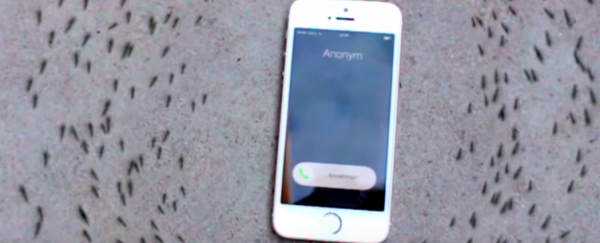
Ants, why are you being so weird? And can you get that? Just take a message, it's fine. Spoiler: the ants don't pick up, but their bizarre reaction to a ringing iPhone in the video above did give us a new appreciation for how machine-like these insects can be. But why the military-precision reaction to something as innocuous as a vibrating phone?
It's all to do with the invisible magnetic forces on Earth that tell dogs where to poop and ants how to find their way home, Australian entomologist Nigel Andrew from the University of New England told the press this week. Perhaps when the phone starts to ring, the radio waves it operates on messes with their sense of direction. "A lot of ants use magnetism to orientate themselves. [They] have magnetic receptors in their antennae," he said. "If they're travelling long distances they use magnetic cues from Earth to know if they are going north, east, south or west."
But even if the vibration of the ringing phone did appear to rile the ants up a little more than usual, forming tightly-organised circles isn't all that strange when it comes to organisms like this, Australian social insect researcher Simon Robson from Queensland's James Cook University (JCU) told ninemsn.
"There are many ants that actually start forming in a circle without the phone," he said. "It's an unavoidable consequence of their communication systems. Having the ants together like that, the shape of the phone may have something to do with it and the vibration might get them a bit more excited, but a lot of ants will do it even without the phone."
You can see a similar - yet far more ominous - display in ant mills, otherwise known as 'death spirals'. When army ants, which are naturally blind, lose track of the pheromone scent that keeps them in contact with their main foraging party, they begin to follow one another, forming a continuously rotating circle. With no other cues to tell them what to do, they will continue in this circle till they die of exhaustion.

As one of the world's leading experts on ant behaviour, American entomologist Edward O. Wilson, makes clear in the quote below, we're better off considering these tiny creatures as chemically influenced cogs in a giant 'superorganism' machine than sentient individuals:
"The second most frequently asked question is, 'What can we learn of moral value from the ants?' Here again I will answer definitively. Nothing. Nothing at all can be learned from ants that our species should even consider imitating."
No wonder they didn't pick up.
